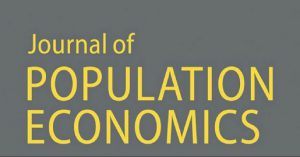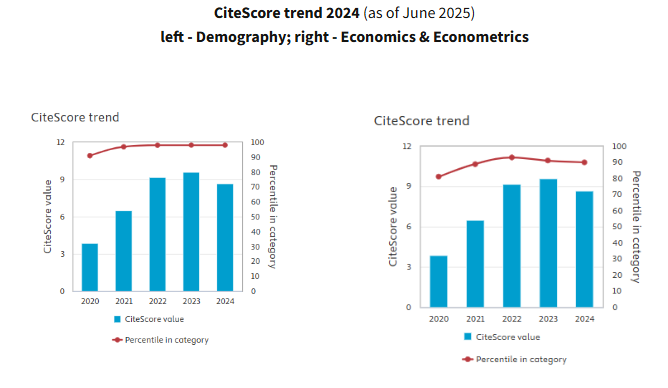
The Journal of Population Economics is a highly cited international quarterly that publishes original theoretical and applied research with significant policy relevance. Covering issues with challenging demographic contexts, its articles provide individual, household, firm, economy-wide and societal perspectives. A focus on United Nations Sustainable Development Goals (SDGs) is particularly welcome.
A. Individual, household or family studies cover partnership formation, divorce, fertility, education, work, migration, health, conflict, violence, risky behavior and aging.
B. Macro topics include economic growth with exogenous or endogenous populations, population policy, savings, pensions, social security, housing, and health care.
C. Societal challenges of interest include gender issues, wellbeing and happiness, sexuality, abortion, religion, poverty, inequality, war, peace and refugees.
D. Firm-related topics include personnel economics and management, skilled labor recruitment, working from home, diversity, robots and artificial intelligence.
E. Studies from business, other social sciences, medicine and related fields like human biology, development, history, and public choice are considered.
F. The journal is published in cooperation with Pop at UNU-MERIT and the Global Labor Organization(GLO).
Looking forward to your high-quality submissions and productive readership!
SSCI IMPACT FACTOR (IF): 3.0 (2024); 3.3 (2023); 6.1 (2022) – 7/50, Q1, in Demography & 125/617, Q1, in Economics in 2024.
IF is calculated as citations in 2024 to Web of Science indexed items published in 2022 & 2023 divided by the number of citable items in 2022 & 2023.
SSCI 5-Year Impact Factor: 4.3 (2024); 4.1 (2023); 5.0 (2022)
SSCI Journal Citation Indicator (JCI): 1.44 (2024); 1.79 (2023); 2.13 (2022). JoPE has 44% more citation impact than the average in its category in 2024.
Rank by JCI. Demography: 6/50 (2024) Q1; 2/49 (2023); 1/49 (2022). Economics: 73/617 (2024) Q1; 45/600 (2023); 24/581 (2022)
CiteScore (Scopus): 8.7 (2024) from 9.6 (2023); 2/140, Q1 in Demography & 72/732, Q1 in Economics and Econometrics in 2024. CiteScore 2024 counts the citations received in 2021-2024 to articles, reviews, conference papers, book chapters and data papers published in 2021-2024, and divides this by the number of publications published in 2021-2024.
SJR (Scimago Journal Rank): 1.805 (2024) from 2.7 (2023)
RePEc Simple Inpact Factor: 19.807 (June 2024), Rank 92 of 4,104 journals

While working already on contributions for volume 40: What they said in 2017 about the Journal of Population Economics on the occasion of the 30th year publishing articles in population economics.
Source: Zimmermann, K.F. Editorial: 30 Years Journal of Population Economics. Journal of Population Economics 30, 1–5 (2017). https://doi.org/10.1007/s00148-016-0621-0
Article FREE TO READ: https://rdcu.be/eq3lP
- “I read each issue”. James J. Heckman, University of Chicago
- “will become more important than ever”. Christopher Pissarides, London School of Economics
- “one of the most important journals of economics”. Kaushik Basu, Cornell University
- “a must read”. Janet Currie, Princeton University
- “an exceptional flagship for population economics”. Bob Gregory, Australian National University
- “a global forum for the rigorous exchange on scientific ideas”. Guillermina Jasso, New York University
- “Its reputation and success have surged”. Ronald Lee, University of California, Berkeley
- “leading journal of economic demography”. David Neumark, University of California, Irvine
Springer Website/submissions
Springer Website/volumes & issues
Google Scholar Citations: All-time JOPE article rankings
Editorial Office
Journal of Population Economics
E-mail: JOPE-Office@glabor.org

Ends;
